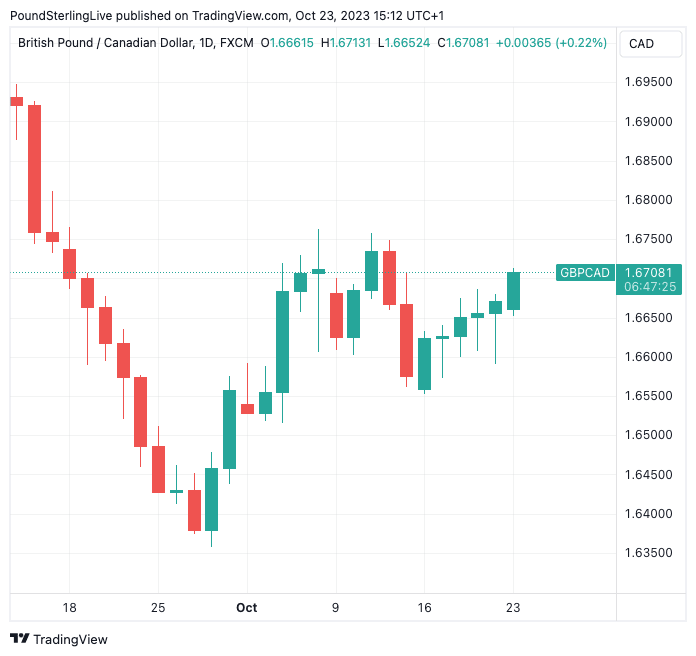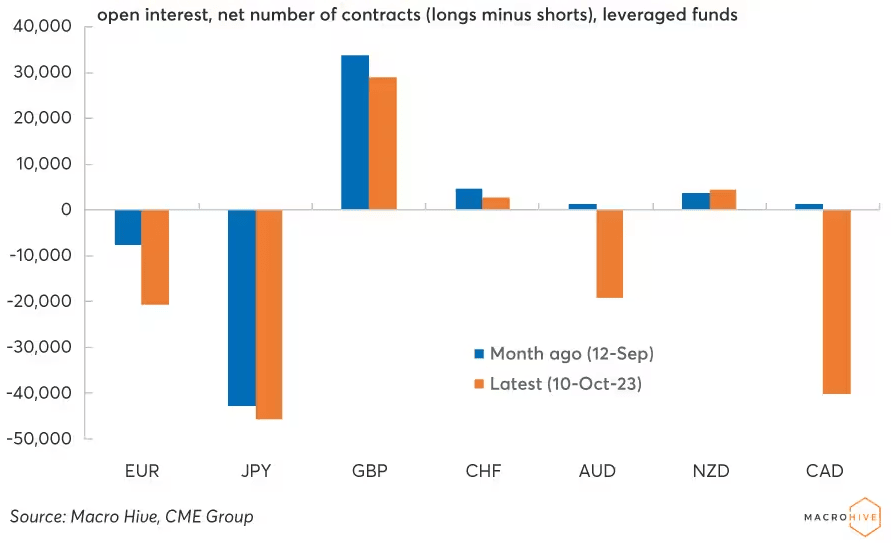Canadian Dollar Week Ahead Forecast: Post-BoC Strength Likely To Be Short-lived
- Written by: Gary Howes

Above File image of BoC Governor Tiff Macklem (right). Image courtesy of the Bank of Canada.
In the coming week, the Canadian Dollar's primary focus is Wednesday's Bank of Canada (BoC) decision, where the market favours an announcement for the policy rate to be maintained at 5.0%.
Such an outcome would be consistent with stable Canadian Dollar exchange rates, meaning any foreign exchange excitement must come from either 1) a surprise decision to raise interest rates or, 2) a decision to hold that is accompanied by a strong indication that the Bank will likely hike again at the next meeting.
The market is only priced at a 1-in-5 chance of a further hike by year-end, suggesting ample space for a rerating in favour of the currency.
"A hawkish hold could see the CAD capitalise," says Daragh Maher, Head of Research for the Americas at HSBC.
Maher says any upside for the Canadian Dollar is most likely to be realised against other G10 currencies - such as the Euro and Pound - rather than the U.S. Dollar.
Compare GBP to CAD Exchange Rates
Find out how much you could save on your pound to Canadian dollar transfer
Potential saving vs high street banks:
C$4,450.00
Free • No obligation • Takes 2 minutes
"Recent comments by Governor Tiff Macklem and Deputy Governor Sharon Kozicki, indicate a willingness to raise the policy rate if needed until conditions are in place to bring inflation all the way back to 2%. The question is whether the BoC’s language makes this seem more likely than the market is
currently priced for," explains the analyst.
Ahead of the decision, the Pound to Canadian Dollar exchange rate is quoted at 1.6692 as it looks to record a sixth consecutive weekly advance, although the advance does not look convincing: it will have taken six days of back-to-back gains to just reverse the sizeable falls from 1.6750 to 1.6562 recorded on October 12 and 13.
Above: GBP/CAD at daily intervals. Set up a daily rate alert email to track your exchange rate OR set an alert for when your ideal exchange rate is triggered ➡ find out more.
The Euro to Canadian Dollar exchange rate is looking a little more assertive and has risen to 1.4546 as the pair extends its October recovery.
Meanwhile, the U.S. Dollar to Canadian Dollar exchange rate is just above 1.37, with the recovery apparently running out of steam.
"The BoC is almost fully priced to hold at this week’s meeting (1 bps priced) after September CPI came in weak on every measure. We continue to expect USD/CAD to rally to 1.3900 into year-end," says Noah Buffam, an analyst at CIBC Capital Markets.
Strategists at Barclays say "risk-reward favours long CAD exposure" into Wednesday's BoC meeting, as market pricing does not reflect the risks of a hawkish hold or even 25bp hike.
"Last week's CPI print may have been a touch softer, but it did little to improve the backdrop of sticky core inflation," says Barclays.
Further evidence pointing to a 'hawkish' Bank of Canada includes wage growth that remains above target-consistent levels and, if anything, has strengthened lately, and firms' price-setting behaviour has yet to normalise per the latest BoC survey.
Barclays strategists are short EURCAD this week, targetting 1.41.
Last week's softer-than-expected Canadian inflation numbers put paid to a rate hike this week, although, "the statement, updated projections and presser from Macklem/Rodgers will still have a lot to say," says Bipan Rai, Head of FX Strategy at CIBC Capital.
Market expectations for rates to be kept on hold were bolstered last week after inflation printed on the soft side of expectations, resulting in broad-based CAD weakness.
Above: "Leveraged funds dive into CAD shorts" - Macro Hive. (See below).
Canadian CPI inflation rose 3.8% year-on-year in September, said Statistics Canada, which makes for a sharp decrease from 4.0% in August and was below expectations for a reading of 4.0%. The month-on-month change stood at -0.1%, which was below expectations for 0.1% and 0.4% recorded in August.
Meanwhile, Core CPI was down 0.1% m/m in August (2.8% y/y), while the trimmed CPI measure was at 3.7% y/y, below the 3.8% expected by markets and 3.9% previously.
But any CAD strength following the BoC decision could yet prove limited in scope and duration. Bilal Hafeez, Head of Research at Macro Hive, says a recent decline in oil prices is an important consideration when viewing the Canadian Dollar's October retreat against the majority of its peers.
He says a run of poor fortune for CAD has prompted hedge funds to reposition more bearishly, noting that this market sector has closed 31.2k long Canadian dollar positions and opened an additional 10.4k short positions over the past month.
"No other currency has seen a larger bearish revision over the period, making the Canadian dollar the currency hedge funds are most net short bar the yen," says Hafeez.
"While near-term oil prices could offer upside to the Canadian dollar, demand will likely falter through H1 2024 as further production comes online. That means the commodity case is weaker than it appears," he adds.
Compare GBP to CAD Exchange Rates
Find out how much you could save on your pound to Canadian dollar transfer
Potential saving vs high street banks:
C$4,450.00
Free • No obligation • Takes 2 minutes






